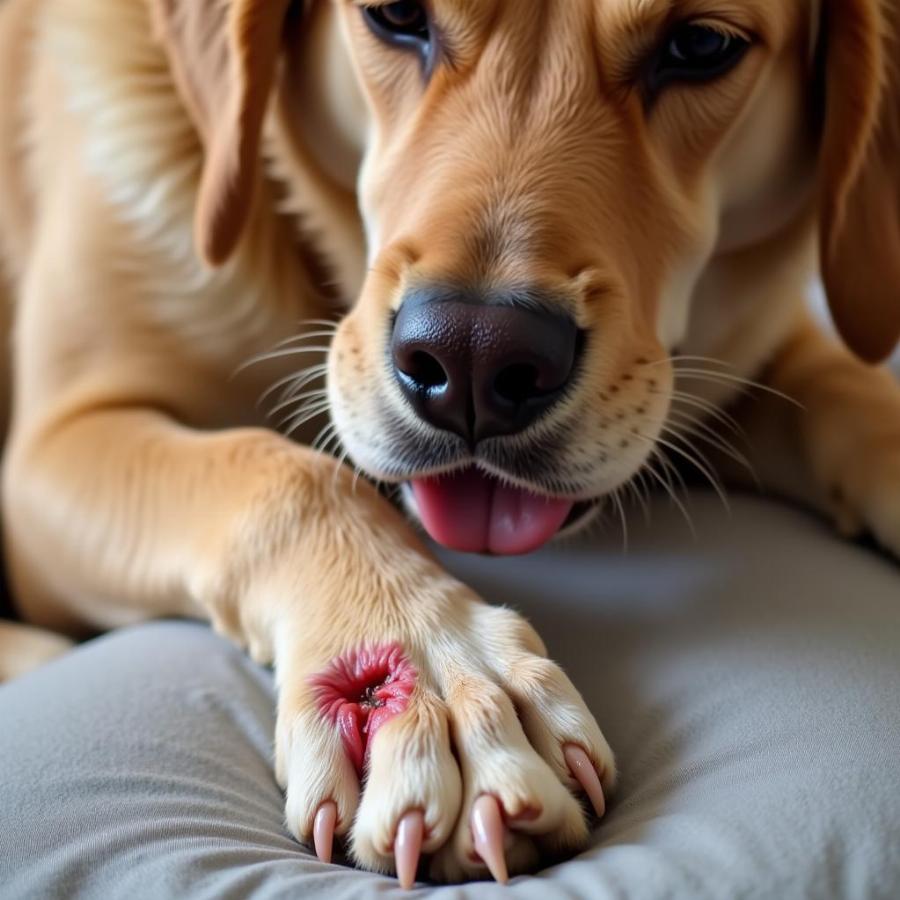Excessive paw licking in dogs can be a common concern for owners. Understanding why your canine companion engages in this behavior is crucial for addressing any underlying issues and ensuring their well-being. From allergies to anxiety, several factors can contribute to why do dogs lick paws a lot. This article will delve into the various reasons behind this behavior, offering insights into diagnosis and solutions to help you alleviate your furry friend’s discomfort.
Common Reasons Behind Excessive Paw Licking
So, why does your dog lick its paws excessively? Several factors can trigger this behavior. Here are some of the most common culprits:
- Allergies: Environmental allergens like pollen, dust mites, and mold can irritate a dog’s paws, leading to incessant licking. Food allergies can also manifest as paw licking.
- Parasites: Fleas, ticks, and mites can cause intense itching and irritation, prompting dogs to lick and chew at their paws.
- Injuries: A cut, thorn, or foreign object lodged in the paw can cause pain and discomfort, leading to increased licking.
- Infections: Bacterial, fungal, or yeast infections can cause inflammation and itching, triggering excessive licking.
- Dry Skin: Just like humans, dogs can suffer from dry, itchy skin, particularly during colder months. This can lead to excessive licking as a means of relief.
- Anxiety and Boredom: Paw licking can be a coping mechanism for dogs experiencing anxiety or boredom. This can become a compulsive behavior.
- Pain in Other Areas: Sometimes, dogs may lick their paws to soothe pain in other parts of their body, such as their joints. This can be especially common in older dogs.
When to Worry About Paw Licking
While occasional paw licking is normal, persistent and excessive licking can be a sign of an underlying problem. Look out for these signs:
- Redness and Inflammation: If the paws appear red, swollen, or inflamed, it’s a sign of irritation or infection.
- Hair Loss: Constant licking can lead to hair loss around the affected area.
- Licking Other Areas: If your dog starts excessively licking other parts of their body, it could indicate a more generalized issue.
- Changes in Behavior: Increased irritability, restlessness, or changes in appetite can accompany paw licking related to pain or discomfort.
 Chó liếm chân bị thương
Chó liếm chân bị thương
How to Address Excessive Paw Licking
If your dog is excessively licking their paws, consult a veterinarian for a proper diagnosis. They can identify the underlying cause and recommend appropriate treatment. Here are some general approaches:
- Allergy Management: Identify and eliminate allergens from your dog’s environment. Your vet may recommend allergy testing and prescribe medication or immunotherapy.
- Parasite Control: Regularly use flea and tick preventatives and treat any existing infestations.
- Wound Care: Clean and treat any injuries on the paws. Your vet may prescribe antibiotics or pain medication.
- Medications: For infections, your vet may prescribe antifungal or antibacterial medications.
- Behavioral Modification: Address anxiety or boredom through increased exercise, mental stimulation, and training.
Is My Dog Licking Its Paws Because of Allergies?
Allergies are a common reason for excessive paw licking. Environmental and food allergies can both cause itchy paws. Look for other allergy symptoms like sneezing, itching, and ear infections.
Can Anxiety Cause My Dog to Lick Its Paws?
Yes, anxiety and stress can manifest as excessive paw licking. If your dog licks its paws more when left alone or during stressful situations, it could be an anxiety-related behavior.
How Can I Stop My Dog From Licking Its Paws?
Addressing the underlying cause is key to stopping excessive paw licking. Consult your veterinarian for a proper diagnosis and treatment plan.
Conclusion
Excessive paw licking in dogs can stem from various reasons, including allergies, parasites, injuries, infections, dry skin, anxiety, and pain. Recognizing the underlying cause is crucial for effective treatment. If your dog is consistently licking their paws, consult a veterinarian for a proper diagnosis and personalized treatment plan. Addressing the issue promptly can help alleviate your dog’s discomfort and improve their overall well-being. Don’t let persistent paw licking go unchecked; seek professional advice to ensure your furry friend lives a happy and healthy life.
FAQs
- Is it normal for dogs to lick their paws occasionally? Yes, occasional paw licking is part of a dog’s normal grooming routine.
- When should I be concerned about paw licking? If the licking is excessive, persistent, accompanied by other symptoms like redness or hair loss, or if your dog seems distressed, consult a vet.
- What can I do at home to help my dog’s itchy paws? Try wiping their paws with a damp cloth after walks to remove allergens and irritants.
- Can I use human anti-itch cream on my dog’s paws? No, never use human medications on your dog without consulting a veterinarian. They can be toxic.
- How can I tell if my dog’s paw licking is due to anxiety? If the licking increases during stressful situations or when left alone, it could be anxiety-related.
Beaut Dogs is your trusted source for all things dog-related. We provide expert advice and resources to help you understand and care for your canine companion. From breed information to health tips, Beaut Dogs is your one-stop shop for dog lovers. When in need of assistance, reach out to our dedicated support team at Email: [email protected] for detailed and accurate answers. We are here to support you and your furry friend on this exciting journey together.